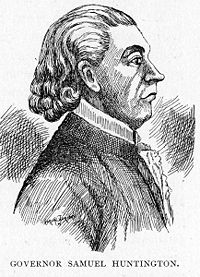Samuel Huntington (politician, 1765)
Samuel H. Huntington (born October 4, 1765 in Coventry , Colony of Connecticut , † June 8, 1817 in Painesville , Ohio ) was an American lawyer and politician and from 1808 to 1810 the third governor of the state of Ohio.
Early years and political advancement
Samuel Huntington was the nephew and adopted son of the Connecticut governor of the same name and signatory of the United States ' Declaration of Independence , Samuel Huntington . He attended Dartmouth College and Yale University by 1785 . After studying law and being admitted to the bar, he began practicing this profession, first in Connecticut and later in Ohio. Since 1801 he was based in Cleveland , which was still small at the time .
Huntington's first public employment was in 1802 when he was tasked with overseeing the local roads in what was then the Northwest Territory . In the same year he became a justice of the peace and a delegate to the Ohio Constituent Assembly. In 1803 he was a member of the first Ohio Senate . Between 1803 and 1808 he served as a judge at the Supreme Court of Ohio , in 1804 he was even presiding judge ( Chief Justice ) of this court. In 1808, he was elected the new governor against two competitors from his own Democratic Republican Party . He also prevailed against incumbent Thomas Kirker , who only finished third behind US Senator Thomas Worthington .
Governor of ohio
Huntington took up his new office on December 12, 1808. During his two-year tenure, the country's capital was temporarily relocated to Zanesville , while the discussion about a permanent location continued. In the face of an impending war with England, which did not break out until 1812, people in Ohio were concerned about the security of the state. A dispute over the appointment of judges in Ohio was also a central theme of those years. After his term in office, Huntington did not seek re-election. Therefore, he resigned from office in December 1810.
After his governorship, Huntington applied unsuccessfully for a seat in the US Senate. Between 1811 and 1812 he was a member of the Ohio House of Representatives . His last public office was during the war with England in 1813 as District Army Paymaster of the US Army. Huntington died in Painesville in 1817. He had two children with his wife, Hannah.
Web links
- Samuel Huntington in the National Governors Association (English)
- Ohio Historical Society (English)
- Samuel Huntington in the database of Find a Grave (English)
| personal data | |
|---|---|
| SURNAME | Huntington, Samuel |
| ALTERNATIVE NAMES | Huntington, Samuel H. |
| BRIEF DESCRIPTION | American lawyer and politician |
| DATE OF BIRTH | October 4, 1765 |
| PLACE OF BIRTH | Coventry , Connecticut |
| DATE OF DEATH | June 8, 1817 |
| Place of death | Painesville , Ohio |
